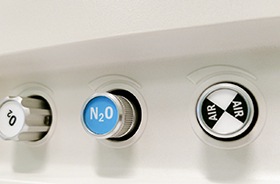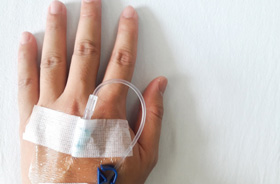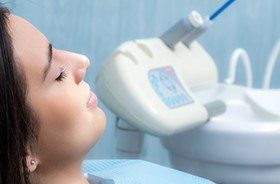Sedation Dentistry – Lebanon, NH
Experience Anxiety-Free Dental Care at Last
Dental phobia is a real and widespread problem that negatively affects patients of all ages and backgrounds. While these feelings can be mild in many cases, other instances are severe enough to result in skipped appointments, habitual dental avoidance, and slowly worsening oral health problems that eventually result in serious damage.
At Santavicca Dental Professionals, we are 100% committed to creating a safe, compassionate, and nurturing environment for your ongoing care. If our personal efforts cannot help you relax alone, several sedative techniques are also available here in Lebanon, NH, including advanced general anesthesia. By matching the severity of phobia and your personal preferences to one of these sedation techniques, we hope to create a genuinely fear-free experience that leaves you smiling. Please contact us today to schedule a consultation with our doctors and our team – we look forward to meeting you!
Nitrous Oxide Sedation

Many patients know this type of sedation by a different name — laughing gas! Nitrous oxide in Lebanon is safe for all ages and may be the right choice for patients who have mild feelings of nervousness or anxiety concerning dental treatment. Our team will attach a nasal mask to a patient that administers the gas, and within minutes, they should feel calmer and more content while still remaining awake. Once the mask is removed, these effects wear off quickly, which means it is easy for a patient to return to their regular routine the very same day.
Who Is a Good Candidate for Nitrous Oxide?

Nitrous oxide is a great choice for many patients who suffer from a mild degree of dental anxiety. However, that is not the only indication that sedation may be right for you. We may recommend nitrous oxide if you:
- Are uncomfortable around needles
- Find it difficult to sit still in the treatment chair
- Have a strong gag reflex
- Are not easily numbed with local anesthesia
Although nitrous oxide is safe for most patients, there are some groups for whom it is not recommended. For example, because it can pose some risks to a developing fetus, pregnant women should not use it. Additionally, those with sinus congestion or certain respiratory conditions may not be good candidates for it.
How Does Nitrous Oxide Work?

First, we provide a nose mask for the patient. The mask is attached to a machine that administers the nitrous oxide. We use controls on the machine to release a mixture of oxygen and nitrous oxide into the nose mask. Very soon after you begin to breathe it in, you should start to feel relaxed, calm, and perhaps euphoric or sleepy. We will adjust your level of sedation as necessary throughout your procedure. At the end of your appointment, the nose mask will be removed, and within minutes, the effects of the nitrous oxide should wear off.
Aftercare for Nitrous Oxide

Although nitrous oxide wears off quite quickly, your sedation dentist in Lebanon will still request that you stay in our office for a few minutes so we can monitor you and make sure that it will be safe for you to drive yourself home. The nitrous oxide itself should not prevent you from returning to your normal activities right away. However, if you underwent an invasive dental procedure, you may need to take it easy at home for a day or two. Be sure to contact us immediately if you suspect you are having any sort of complications, whether it is from the nitrous oxide or your dental treatment.
Oral Conscious Sedation

Oral conscious sedation offers a more powerful degree of relaxation for patients in need. We will prescribe medication and also provide detailed instructions for when to take it before your appointment is set to begin. While you will remain conscious enough to respond to any requests from our team, it is likely that you will enter a deep stage of comfort and not remember much about your visit once you have fully recovered. Please make sure to arrange for an escort to bring you to and from our practice, since you will be unable to drive yourself.
What Is Oral Conscious Sedation?

With oral conscious sedation, all you have to do is take a prescribed medication shortly before your treatment is scheduled to begin. Within about 15 minutes or so, you should start to feel its effects. The medications used for oral conscious sedation can vary, but Valium, Ativan, and Halcion are common choices.
Many patients are attracted to the ease of oral conscious sedation. No needles or masks are necessary, and it can help you remain relaxed throughout even relatively complex and intensive procedures.
How Does Oral Conscious Sedation Work?

Oral conscious sedation is relatively powerful, so you might feel quite drowsy while under its influence. You could even drift off to sleep during your procedure. If that happens, it should be easy for our team to awaken you with gentle stimuli. Overall, you should remain alert enough to respond to questions and directions from our team.
The effects of this type of sedation can linger for several hours after your appointment. Until it wears off completely, you should not drive or do anything else that poses a risk of injury. Rather, you should set aside the day to relax and start recovering from your procedure.
Are You a Good Candidate for Oral Conscious Sedation?

You may be a good candidate for oral conscious sedation if you:
- Struggle with dental fear or anxiety.
- Have a very sensitive gag reflex.
- Require complex or invasive treatment.
- Find it difficult to sit still in the dental treatment chair.
- Are not easily numbed by local anesthetic.
- Are free of contraindications that could make sedation unsafe for you. For example, it is not recommended for pregnant individuals or those with certain respiratory conditions.
IV Sedation

IV sedation is similar to oral conscious sedation, but it offers one significant advantage — the medication is administered intravenously (through the vein, directly into the bloodstream), which means that the dosage can be easily adjusted throughout the treatment process to achieve the ideal level of sedation. While this technique is not designed to render patients unconscious, some may feel so at ease that they doze off. Many people even say that it helps entire appointments feel like they only take a few minutes!
What Is IV Sedation?

IV sedation involves the direct administration of sedatives into the bloodstream, typically through a small needle on your hand or arm. This type of sedation may also be called “twilight sedation” or even “sleep dentistry.” Although it does not cause unconsciousness, many patients drift off to sleep while under its influence. If that happens to you, it should remain easy for us to awaken you with gentle stimuli.
Once we begin to administer the sedative, you should start to feel very calm and relaxed within just a few minutes. You should remain in this state throughout your appointment. The effects of the sedation may linger for up to an entire day after you go home, so it is important to avoid any potentially dangerous activities, such as driving, during that time.
Who Is a Good Candidate for IV Sedation?

You might be a suitable candidate for IV sedation if:
- You struggle with moderate to severe dental anxiety or fear.
- You have a very sensitive gag reflex.
- You are not easily numbed by local anesthesia.
- You need to undergo multiple or complex procedures in a single appointment.
- Due to certain medical conditions, it is difficult for you to remain still for extended periods.
Our team will also need to screen you for any contraindications for sedation. For example, you should not be pregnant or have certain medical conditions, such as some types of respiratory disorders.
The Benefits of IV Sedation

IV sedation offers some remarkable benefits:
- Works quickly: IV sedation begins working within minutes, providing fast relief from anxiety and discomfort.
- Customizable sedation level: We can adjust the depth of sedation during the procedure to match your needs.
- Increased comfort: You can expect to experience a deep state of relaxation, minimizing stress and fear throughout treatment.
- Amnesia effect: Most patients remember little or nothing about the procedure, reducing post-treatment anxiety.
- Reduced gag reflex: IV sedation suppresses the gag reflex, making procedures easier for those who find it difficult to tolerate objects in their mouth.
- Efficient appointments: Complex or multiple treatments can be completed in one visit with minimal discomfort.
General AnesthesiA

At Santavicca Dental Professionals, we are happy to have the assistance of an in-house anesthesiologist who can help patients achieve full sleep during their procedures. This advanced technique is typically recommended for cases of severe anxiety/fear or overly long procedures that require patients to sit still for an uncomfortable amount of time. You will be monitored closely at all times to ensure your safety. Once you’re finished and recovered, you will have no memory of your treatment – only a better, brighter smile!
Sedation Dentistry FAQs
Is Sedation Dentistry Safe?
You may wonder about the safety of sedation dentistry when considering it for your dental care. We want to reassure you that your well-being is our top priority. As your sedation dentist in Lebanon, we follow strict protocols and carefully review your medical history before recommending any sedation option. We carefully analyze risks and always strive to make sedation as safe as possible. Plus, our team will monitor you closely throughout the process to promote your safety at every step.
Sedation dentistry is a well-established practice, and it has a strong track record of being safe and effective.
Is Sedation Dentistry Safe While Pregnant?
If you are pregnant and considering sedation dentistry, you may have questions about the safety of this provision. We understand your concerns and always take extra precautions with our expecting patients. In most cases, elective dental treatment is best postponed until after pregnancy, but there are situations where treatment is necessary.
Certain sedation methods, such as nitrous oxide, may be considered in specific circumstances, while others are generally avoided during pregnancy. That is because there is a risk that the sedatives could pass through the placenta and affect the developing baby.
The good news is that local anesthesia (numbing) is considered perfectly safe during pregnancy.
Will I Remember Anything with Dental Sedation?
Many patients ask if they will remember their dental procedure after receiving sedation. The answer depends on the type of sedation used and your individual response. With lighter sedation methods like nitrous oxide, you may remain awake and recall most of the appointment, but you will likely feel more at ease and less concerned about the procedure.
When we use oral conscious sedation, IV sedation, or general anesthesia, there is a greater chance that you will remember little to nothing about your treatment. A lot of patients like this feature of sedation because they feel uneasy with the sights, sounds, and sensations of dental procedures.
What Does It Feel Like to Be Sedated at the Dentist?
With our sedation options, you can expect to feel deeply relaxed, and sensations of anxiety or discomfort will fade away. Nitrous oxide, for example, produces a light, calming effect, while oral conscious sedation and IV sedation offer a deeper sense of relaxation, sometimes making you feel drowsy or detached from the procedure. General anesthesia causes complete unawareness of your surroundings.
How Much Does Sedation Dentistry Cost?
Understanding the cost of sedation dentistry is an important consideration for many patients. The fees associated with sedation can vary depending on the type of sedation chosen, the length and complexity of your dental procedure, and whether multiple visits are needed. We believe in full transparency and will discuss all financial aspects with you before your treatment begins.
We will work with you to find the most appropriate and affordable solution for your needs. If you have dental insurance, some plans may cover a portion of sedation services. Our team also works with third-party companies to provide low-interest payment plans for qualified patients.
